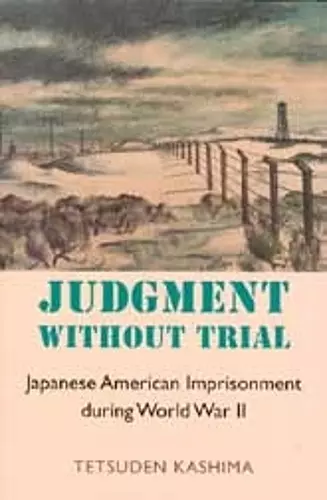Judgment Without Trial
Japanese American Imprisonment During World War II
Format:Paperback
Publisher:University of Washington Press
Published:1st Oct '04
Currently unavailable, and unfortunately no date known when it will be back

A major contribution to WWII Japanese American history using previously unavailable sources
Reveals that long before the 1941 attack on Pearl Harbor, the US government began making plans for the eventual internment and later incarceration of the Japanese American population.
2004 Washington State Book Award Finalist
Judgment without Trial reveals that long before the 1941 attack on Pearl Harbor, the U.S. government began making plans for the eventual internment and later incarceration of the Japanese American population. Tetsuden Kashima uses newly obtained records to trace this process back to the 1920s, when a nascent imprisonment organization was developed to prepare for a possible war with Japan, and follows it in detail through the war years.
Along with coverage of the well-known incarceration camps, the author discusses the less familiar and very different experiences of people of Japanese descent in the Justice and War Departments’ internment camps that held internees from the continental U.S. and from Alaska, Hawaii, and Latin America. Utilizing extracts from diaries, contemporary sources, official communications, and interviews, Kashima brings an array of personalities to life on the pages of his book — those whose unbiased assessments of America’s Japanese ancestry population were discounted or ignored, those whose works and actions were based on misinformed fears and racial animosities, those who tried to remedy the inequities of the system, and, by no means least, the prisoners themselves.
Kashima’s interest in this episode began with his own unanswered questions about his father’s wartime experiences. From this very personal motivation, he has produced a panoramic and detailed picture — without rhetoric and emotionalism and supported at every step by documented fact — of a government that failed to protect a group of people for whom it had forcibly assumed total responsibility.
"Kashima's much-needed and well-received volume examines, in well-documented details, the complex, and often insidious, military and governmental bureaucratic jostling for power and position, and the decision-making process that forced thousands—17,477—of Japanese Americans to be imprisoned.."
* Journal of the West *"This book lucidly delineates the complicated history of these camps that held Japanese Americans, alien Italians and Germans, and Latin American Japanese. . . . Judgment Without Trial, by telling how it happened 60 odd years ago, reminds us of the government’s ability to harm people by subverting the liberties Americans hold dear."
* International Examiner *"This dense scholarly exploration of the experiences of World War II internees, and in particular of the directives and procedures that governed the internment process, is of particular interest because, unlike many books on the subject, it contains a detailed study of the process as it occurred outside the contiguous United States."
* Advertiser *"This is a rich, meticulously researched, and vitally important book. Combining what might be called standard political history with social history and case studies, he explains, in considerable detail, the administrative process for determining who would be relocated and where and the operations of the federal agencies responsible for turning these plans into reality. . . . Kashima’s prodigious research and well-honed arguments speak for themselves—and speak to recent developments and the question of when justice for all is justice only for some."
* Pacific Northwest Quarterly *"Readers familiar with the literature on the imprisonment will appreciate both Kashima’s painstaking research and his ambitious effort to describe the imprisonment in all its dimensions. Judgment Without Trial proves that the imprisonment was not an act of wartime hysteria. Instead, it was thoroughly planned. . . . Kashima’s book also makes clear that Nikkei had to confront—usually without legal counsel—a bewildering array of federal agencies in their efforts to secure their rights."
* Western Historical QuarterISBN: 9780295984513
Dimensions: unknown
Weight: 476g
336 pages